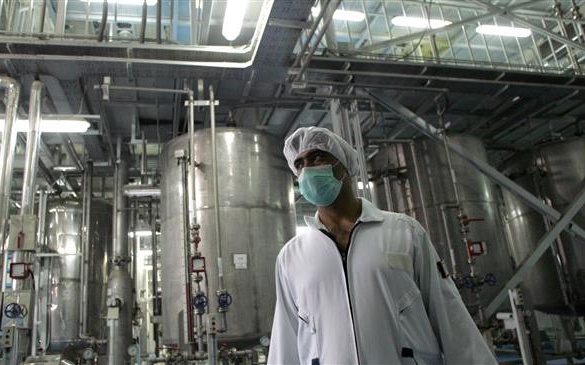UPDATE, SEPT 12:
International Atomic Energy Agency head Rafael Grossi will be in discussions with Iranian officials in Tehran on Sunday.
More than 2 1/2 months after the expiry of its deal with the IAEA over nuclear inspections, Iran has finally relented and accepted Grossi’s request for a visit.
It comes days after the IAEA found Tehran had “seriously undermined” inspections arrangements, and ahead of this week’s meeting of the IAEA’s Board of Governors to discuss follow-up action.
The IAEA and Iran’s envoy said Grossi will meet the new head of the Atomic Energy Organization of Iran, Mohammad Eslami.
Ahead of the discussion, Iran’s officials are continuing their tough talk about restricting inspections.
An “informed source” told State outlet Press TV, “There will be no change in the IAEA’s access to the data at nuclear facilities, and the agency will still have no access to the surveillance cameras’ footage.”
He continued, “The talks during the director general of the International Atomic Energy Agency’s visit to Tehran will only be about servicing some of the agency’s monitoring equipment and there is no other issue on the agenda.”
Grossi is expected to hold a news conference upon his return to Vienna airport on Sunday night.
ORIGINAL ENTRY, SEPT 9: The International Atomic Energy Agency has warned that Iran has “seriously undermined” inspections of its nuclear facilities.
The IAEA released a report on Tuesday, 2 1/2 months after its agreement with Iran on inspections expired. It told member states that its confidence in assessing Iran’s activities — a “continuity of knowledge” — is declining and will continue to do so “unless the situation is immediately rectified by Iran”.
In February, Iran blocked snap inspections and withheld all video surveillance tapes from the IAEA. After the expiry of the agreement in late June, Iranian Foreign Ministry spokesman Saeed Khatibzadeh insisted, “No decision, either negative or positive has been made.”
However, Tehran has made no move since then for discussions with the IAEA. Instead, the Iranians rejected an Agency approach for a visit to Iran this month.
The IAEA said it needs urgent access to monitoring equipment. Diplomats said inspectors need to swap out memory cards to continue observation.
The Agency also said there was no progress over three undeclared Iranian sites, from before 2003, where traces or uranium had been discovered.
Raisi Warns IAEA About Being “Non-Constructive”
President Ebrahim Raisi insisted on Wednesday, in a phone call with European Council chief Charles Michel, “The Islamic Republic of Iran’s serious cooperation with the International Atomic Energy Agency is a clear example of Iran’s will to be transparent about its nuclear activities.”
Yet Raisi indicated there would be no shift in Tehran’s position by blaming the Agency, “Of course, if the IAEA has a non-constructive approach, it’s unreasonable to expect a constructive response from Iran. What’s more, non-constructive actions of course upset the negotiation process [over renewal of the 2015 nuclear deal].”
See also Iran — No Resumption of Nuclear Talks for “2 to 3 Months”
Responding to US sanctions, Iran began suspending compliance in 2019 with provisions of the 2015 nuclear agreement with the other 5+1 Powers (UK, France, Germany, China, and Russia). In January 2021, it returned to the pre-2015 level of 20% enriched uranium. In April, Tehran enriched its first 60% uranium, which potentially can be further enhanced to military-grade 90%.
The IAEA said Tuesday that Iran has quadrupled the stock of 60% uranium since May, following installation of a second cascade of centrifuges.
Time Running Out For Nuclear Deal?
Following the IAEA report, US Secretary of State Antony Blinken warned that the window is closing for a renewed 2015 deal, with an American return after the Trump Administration’s withdrawal in May 2018.
“I’m not going to put a date on it but we are getting closer to the point at which [Iran’s] strict return to compliance with the JCPOA [Joint Comprehensive Plan of Action] does not reproduce the benefits that that agreement achieved.
Last month the three European participants — the UK, France, and Germany — issued a statement of “grave concern” about Iran’s enrichment of 60% uranium.
German Foreign Minister Heiko Maas said on Tuesday that Iran’s position of no resumption of the Vienna talks for two to three months is “far too long”.
He said he had phoned Iranian counterpart Hossein Amir Abdollahian so Tehran would “return more swiftly to the negotiating table”.

